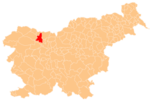Begunje na Gorenjskem
Begunje na Gorenjskem | |
|---|---|
 | |
| Country | |
| Traditional region | Upper Carniola |
| Statistical region | Upper Carniola |
| Municipality | Radovljica |
| Area | |
• Total | 18.6 km2 (7.2 sq mi) |
| Elevation | 577.6 m (1,895.0 ft) |
| Population (2012) | |
• Total | 1,014 |
| [1] | |
Begunje na Gorenjskem (Template:Lang-de) is a village in the Municipality of Radovljica in the Upper Carniola region of Slovenia. It is known for being the location of the headquarters of the Elan Line company.
Name
Begunje na Gorenjskem was first attested in written sources in 1050 as Begûn (and in 1063 as Uegun). The name of the settlement is derived from the personal name *Běgunъ, probably as a clipped version of *Běgun'e (selo) 'Běgunъ's village' (i.e., a neuter singular form) that later shifted to a feminine plural form.[2]
History

The ruins of 12th-century Kamen (German: Stein or Stain) Castle are just outside the village in the Draga Valley. First documented in 1185, it appeared as Castrum Lapis in 1263 and Stain in 1350, when it passed into the Carniolan possessions of the Counts of Ortenburg. The castle played a vital role in protecting the comital lands in the Bohinj and Upper Sava Valley. When the Ortenburgs became extinct in 1418, it passed to Count Hermann II of Celje and was inherited by the Austrian House of Habsburg in 1456.
The 15th-century Kacenštajn Castle, rebuilt in the late 17th century, stands in the centre of the village. Used as women's prison in the time of the Kingdom of Yugoslavia, it was seized as Upper Carniolan headquarters of the Nazi German Gestapo in World War II. 12,134 hostages were held here, more than one thousand inmates were killed, others were deported to Nazi concentration camps like Mauthausen. After the war, a Yugoslav labor camp for political prisoners operated in the village.[3] A memorial and a museum dedicated to the victims were set up in part of the building, which today houses a psychiatric hospital accepting patients from all over the Upper Carniola region.
Mass graves
Begunje na Gorenjskem is the site of six known mass graves from the period immediately after the Second World War. The Krpin Gravel Pit 1 and 2 mass graves (Template:Lang-sl) are located north of the settlement; the first is in the bushes a few meters above the paved road, between a gravel pit and a dirt road, and the second is a few dozen meters higher, on a slope to the left of the path. The graves contain the remains of at least 20 Russian Liberation Army prisoners of war and civilians that were murdered at the end of June or beginning of July 1945.[4][5] The Krpin Ski Slope 1–3 mass graves ([Grobišče smučišče Krpin 1–3] Error: {{Lang}}: text has italic markup (help)) are located north of the settlement; the first and second are in a picnic area behind a shed, and the third is on level ground behind the ski slope. The graves contain the remains of Russian Liberation Army prisoners of war and civilians murdered at two locations in the nearby gravel pit.[6][7][8] The Mazevec Crevasse Mass Grave ([Grobišče Mazevčev pruh] Error: {{Lang}}: text has italic markup (help)) is located north of Kamen Castle, on the edge of a quarry below a large spruce tree, and is 10 m long. It contains the remains of German prisoners of war from Begunje and probably also civilian victims murdered on 29 May 1945.[9]
Notable people
Notable people that were born or lived in Begunje na Gorenjskem include:
- Slavko Avsenik (born 1929), composer and musician[10]
- Anton Bonaventura Jeglič (1850–1936), bishop of Ljubljana[10]
- Jakob Prešern (1888–1975), writer[10]
Gallery
-
Katzenstein mansion
-
Katzenstein mansion
-
Kamen Castle
Trivia
Begunje is an important site in "Comrades, Avenge Us," by Stephen G. Esrati, published by Xlibris. The novel concerns a failed O.S.S. mission in Yugoslavia. In the novel, General Rösener is cast as Lt. Gen. Friedrich Ritter von Gail.
References
- ^ Statistical Office of the Republic of Slovenia
- ^ Snoj, Marko. 2009. Etimološki slovar slovenskih zemljepisnih imen. Ljubljana: Modrijan and Založba ZRC, p. 54.
- ^ Mrvič, Irena. 1999. "Taborišče." Enciklopedija Slovenije, vol. 13 (Š–T), pp. 177–179. Ljubljana: Mladinska knjiga, p. 179.
- ^ Krpin Gravel Pit 1 Mass Grave on Geopedia Template:Sl icon
- ^ Krpin Gravel Pit 2 Mass Grave on Geopedia Template:Sl icon
- ^ Krpin Ski Slope 1 Mass Grave on Geopedia Template:Sl icon
- ^ Krpin Ski Slope 2 Mass Grave on Geopedia Template:Sl icon
- ^ Krpin Ski Slope 3 Mass Grave on Geopedia Template:Sl icon
- ^ Mazevec Crevasse Mass Grave on Geopedia Template:Sl icon
- ^ a b c Savnik, Roman, ed. 1968. Krajevni leksikon Slovenije, vol. 1. Ljubljana: Državna založba Slovenije, p. 277.




